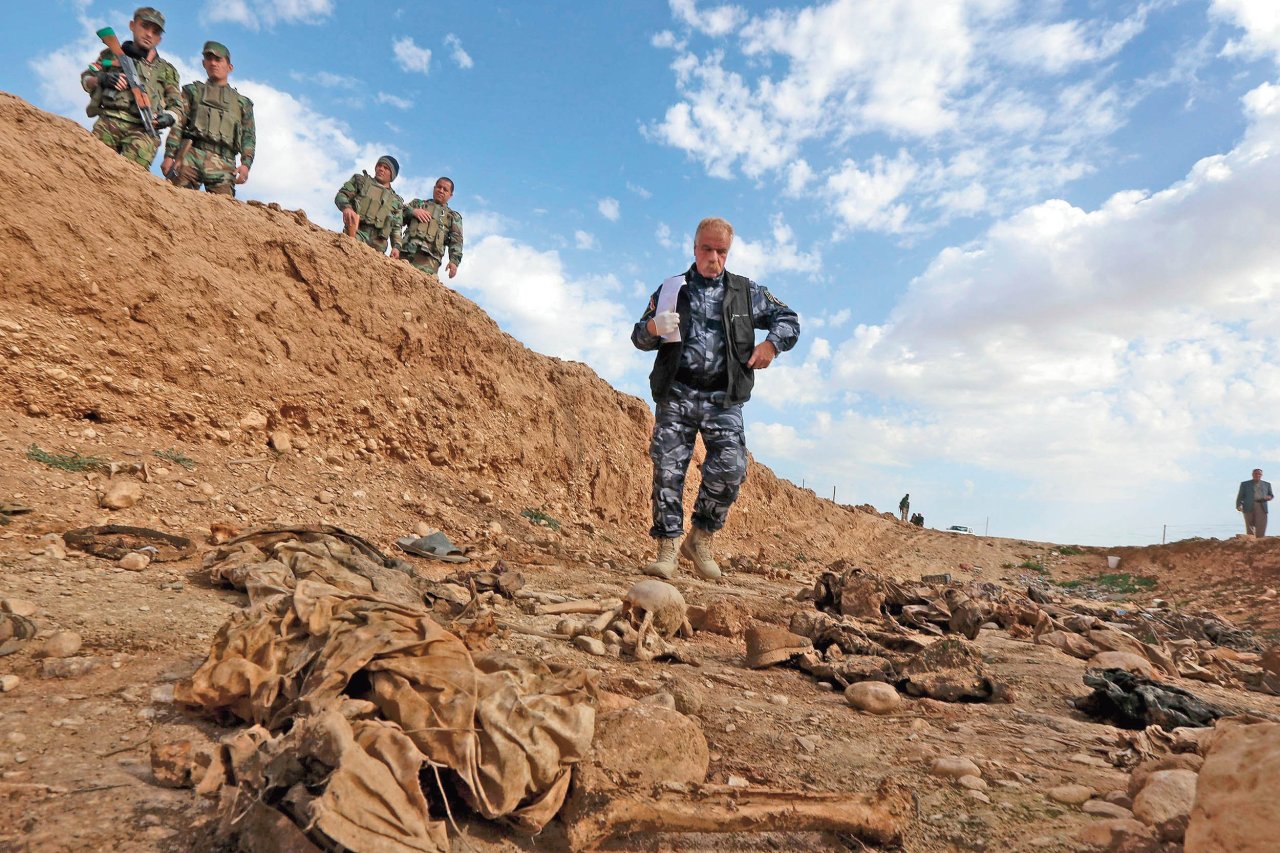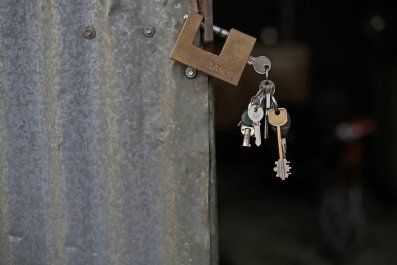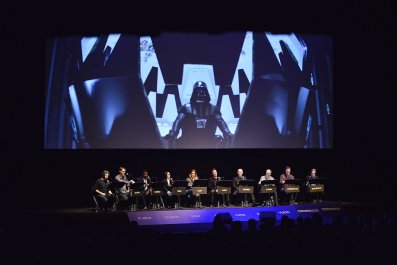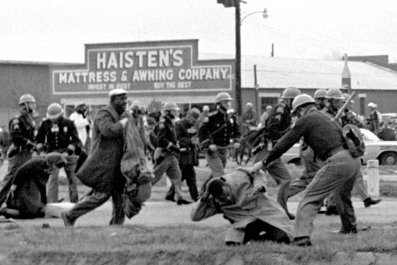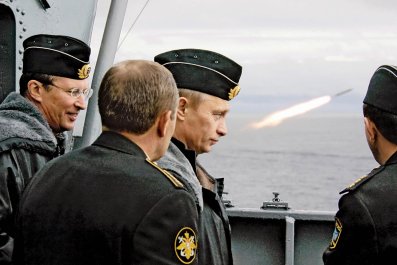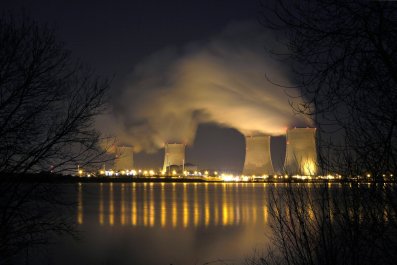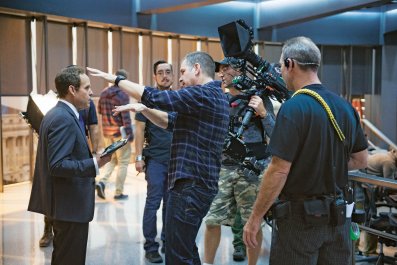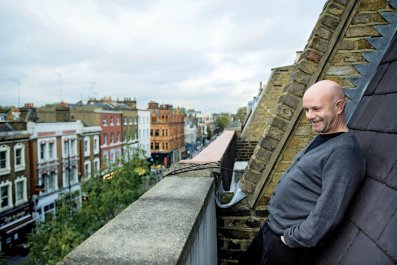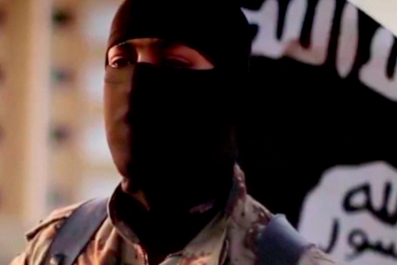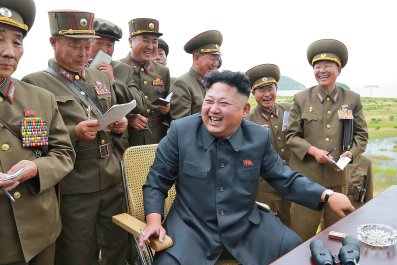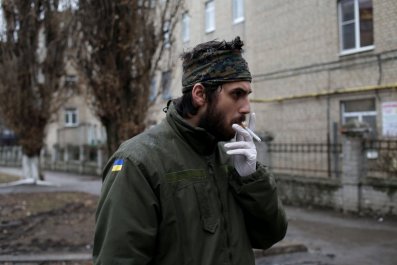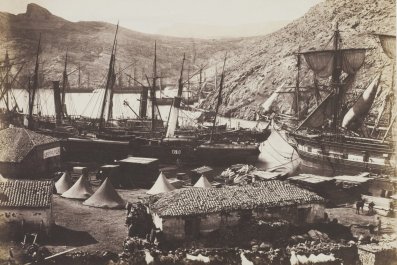The front line of the fight against ISIS in northern Iraq is manned by Kurdish fighters ranging from the young to veterans who proudly carry the same weapons they used to fight in the Iran-Iraq War three decades before. Mohamad Barzani, 60, says he has spent "40 years fighting. First the Iranians, then Saddam Hussein." He has been based on this rocky hillside, surrounded by deserted villages and bombed-out houses, for four months. "But we are fighting for something," he says, pointing to the tattered Kurdish flag positioned on top of a pile of sandbags.
Kurdish fighters like him, known as the peshmerga, will play a role in the attempt to retake Mosul from ISIS, which could come as soon as April, according to an official at U.S. Central Command, to avoid the heat of summer and the holy month of Ramadan, which starts in mid-June. But the Kurds have their eyes on the future rather than on Mosul, a largely Sunni-Arab city that historically had only a small minority of Kurds and is outside the semiautonomous region of Kurdistan.
Black Tiger Camp, near where ISIS fighters threatened the Kurdish capital of Arbil last summer, is the command center for one of the longest front lines in Iraq. "Sector 6" of the front line runs from the town of Makhmour to Gwer and is commanded by Sirwan Barzani, a former telecommunications businessman before the rise of ISIS and a nephew of Kurdish President Masoud Barzani. An intelligent, thoughtful commander, Barzani says he has not been informed by Baghdad or coalition forces of the plan to retake Mosul, which is only about 50 miles from his base. "It's a political decision, done in Baghdad," he says.
The plan to retake Mosul has been met with much skepticism, in large part because Iraqi police and soldiers abandoned their posts when the jihadists roared into town on June 10 last year. Much of the Iraqi military melted into the population, embarrassing the Baghdad authorities, who maintain their army is strong. Now the United States is providing training and equipment to Iraqi forces in anticipation of the campaign for Mosul.
According to Barzani, the past six months have been difficult for his men, but they have consistently pushed ISIS back. "The airstrikes are helping us, for sure," he says. "We have good coordination with the coalition so that every 10 days we are able to have a major operation. When the airstrikes are precise and hit ISIS targets, the peshmerga can move in closer and try to capture tanks and push back ISIS fighters. There have been zero civilian casualties with the airstrikes." But the fight has taken its toll on the peshmerga across the region: The official death toll reached nearly 1,000 in February.
The U.S. Central Command official says the Mosul attack force would have around 20,000 to 25,000 Iraqi troops, including five Iraqi Army brigades, three smaller brigades in reserve, a "Mosul fighting force" of local police and tribal fighters, and some Iraqi special forces. Three peshmerga brigades would play a role to "contain from the north and isolate from the West," the official says.
The battle-hardened peshmerga have proved themselves against ISIS, but they are being pushed into an uneasy alliance with Iraqi army forces from Baghdad, Shiite militias and Sunni tribal fighters. Without the Kurds in a leading role, the Iraqi army will have to perform much better than it did when Mosul was taken. A question that worries Iraqis and observers: What happens to the alliance if ISIS is defeated?
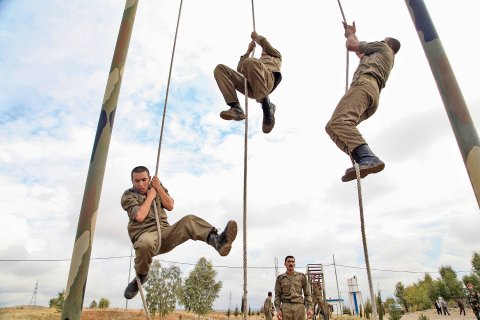
Biding Their Time
What the Kurds do not need, Sirwan Barzani and other peshmerga commanders stress, is more men. They are dubious about the abilities of the Iraqi army, and nervous about the rise of the Shiite militias that roam Baghdad and have been fighting alongside the army. "We need what ISIS has," Barzani complains. "Weapons. Remember, ISIS are well armed. They took five divisions of Iraqi army equipment. If we have weapons, we can do it."
While many peshmerga officials and the military complain they are under-equipped, U.S. and Baghdad officials say they are getting plenty of equipment. The Kurds have also been accused of using the crisis to establish a Kurdish state in the north. According to analyst Denise Natali of the Institute for National Strategic Studies, the peshmerga's victories have been increasing tensions with Sunni Arab communities. "As Iraqi Kurds benefit from coalition airstrikes and take control of former ISIS safe havens in northern Iraq, they are engaging in demographic and territorial engineering to advance their nationalist agenda," writes Natali in online newspaper Al-Monitor.
It is no secret that the Kurdish Regional Government is often at odds with Baghdad, mainly over budget and border issues, or that the Kurds want a state of their own, in part because their history is rife with betrayal and attempts at annihilation. They survived a near-genocide when Saddam Hussein launched the notorious al-Anfal campaign against them in the final stages of the Iran-Iraq War, from 1986 to 1988. According to Iraqi prosecutors, as many as 182,000 people were killed, mainly men of fighting age.
The majority of Kurds are Sunni, but religion does not define them. "We have always been more nationalistic than religious in our thinking," says Majeed Gly, a journalist at Rudaw, the Kurdish media network, who is from Kirkuk. Some complain that Kurdish fighters will fight to the death for their territory, but when Christian or minority towns fall, such as Sinjar, they disappear.
That's why Sunni Arabs in Kirkuk have requested their own militia for local protection. President Barzani emphatically refused, but as a concession, the Ministry of Peshmerga is training about 300 Christian militia fighters who will fight primarily alongside peshmerga in Christian regions such as the Nineveh Plains. They have already trained Yazidis (who come from the Sinjar district) and the Shabak, who are mainly Shiite Kurds.
Before it was taken, Mosul had a population of about a million people, with a Sunni-Arab majority and significant Assyrian-Christian, Iraqi Turkmen and Kurdish minorities. Since the occupation, it is estimated that Sunni Arabs have mostly remained in the city, along with around 2,000 ISIS fighters.
The Kurds have bided their time and are using the current crisis to their advantage. In June, shortly after the fall of Mosul, peshmerga forces rushed to take Kirkuk, the "Jerusalem" of Kurdistan. The northeastern city is rich in oil, and both Baghdad and the Kurds claim it as their own.
Privately, Kurdish officials and Western diplomats say the Kurds are not ready, economically and politically, for independence. But the Kurds counter that they are now doing the heavy lifting against ISIS because Baghdad cannot control the Shiite militias and its army is in disarray. "We are fighting [ISIS] is to protect our region but also to protect the free world," says Safeen Dizayee, a Kurdish Regional Government spokesman. "At the same time, we are not fighting a proxy war. We are not mercenaries that you can pat on the back and say, Good job, old chap."
Extremely Loyal…for Now
On February 17, the peshmerga scored an important victory near Makhmour, which is southeast of Mosul. The morning after the battle, an exhausted Commander Najat Ali Salih says ISIS had fought hard. "It began close to midnight and went on for hours. ISIS used everything they had—small arms, anti-aircraft, RPGs, DShKs [Soviet-made heavy machine guns]."
Nearby was an armored vehicle, and in front of it lay two dead ISIS fighters. Both were very young, and their faces seemed frozen, at the moment of death, in surprise. Scattered around them on the ground were anti-aircraft shells.
Villagers congratulated the commander on his victory, which he says took back several miles of Kurdish territory. It was a psychological victory, a moral boost, he says. "When we first started fighting ISIS back in August, we saw they used tactics that we were not yet used to—fear, for instance. Some of the peshmerga were afraid of the beheading. Now we understand how they fight. So we can beat them."
Salih says when he arrived here in August, ISIS controlled 50 to 60 percent of the area, but he has been progressively capturing more and more territory.
In small Arab villages west of Kirkuk, and very close to ISIS-held territory, Sunni Arabs (who do not consider themselves Kurds) say that they are living well under the peshmerga and that even if ISIS takes their villages, they will remain loyal. "We have two enemies now, ISIS and the Shiite militias," one villager says.
Many Sunni Arabs have felt deep resentment since the fall of Saddam, a Sunni, in 2003, with Shiite-led governments consistently undermining them.
There is widespread fear, especially in Kirkuk and Arbil, of "sleeper cells" of ISIS followers who will rise up if the militias reach their territory. This was the case in Mosul, which sleeper cells had infiltrated long before the fall of the city in June 2014. "We know for sure there are sleeper cells of ISIS supporters here," says Jawad Mohamed Ahmed, a political and military official in the Kurdish Democratic Party, one of the main Kurdish factions. "We had trouble with some Arab villagers who said they were on our side, but when ISIS arrived and the fighting started, whose side were they on? They started shooting at us."
But local Sunnis insist—perhaps because they are surrounded by peshmerga—that they will remain loyal to Kurdistan. They say they know of collaborators in the village who communicate with ISIS by email and SMS. "But I have reasons never to collaborate," says one elderly Sunni Arab man in Malha, a village in one of the region's richest oil areas. "My daughter and son were killed by Sunni insurgents a few years ago. The insurgents have now gone on to become ISIS. It's the same men who killed my family. If they come here, I am with the peshmerga."
In many ways, the battle against ISIS has hardened the sectarian divisions. "Ultimately, the Kurds have no interest in fighting [ISIS] on behalf of the world. It's about taking disputed territories and ensuring that they are safe enough from the threat of [ISIS]," says Iraqi writer and analyst Ali Hadi al-Musawi. "But what happens once [ISIS] is defeated in Iraq? Will the Kurds hand Kirkuk back over to the federal government? Will they allow the constitutional committee to determine the fate of the disputed territories? Will they use their newly acquired weapons to resist these efforts? What happens to non-Kurdish communities in areas they control?"
These are not new questions. In the aftermath of World War I, when Gertrude Bell, a British government official and Arabist, sat down to draw the map of modern Iraq, the Kurdish question bedeviled her too. Though "Miss Bell," as the Iraqis called her, had managed (along with her Foreign Office colleague T.E. Lawrence) to convince the Sunni tribesmen to work together, she was frustrated by what to do with the Kurds. "Kirkuk has refused rudely to swear allegiance to [King] Faisal," she wrote, on a tense train journey north to Kirkuk from Baghdad.
To Majeed Gly, the Rudaw journalist, the real question, post-ISIS, is what will become of Kirkuk, which is believed to be the next major flash point in this war, once Mosul is recaptured.
Kirkuk, Gly says, "is part of Kurdish legend. Since the 1960s, it has become hugely important to us. Without Kirkuk, an independent Kurdistan is not viable."



